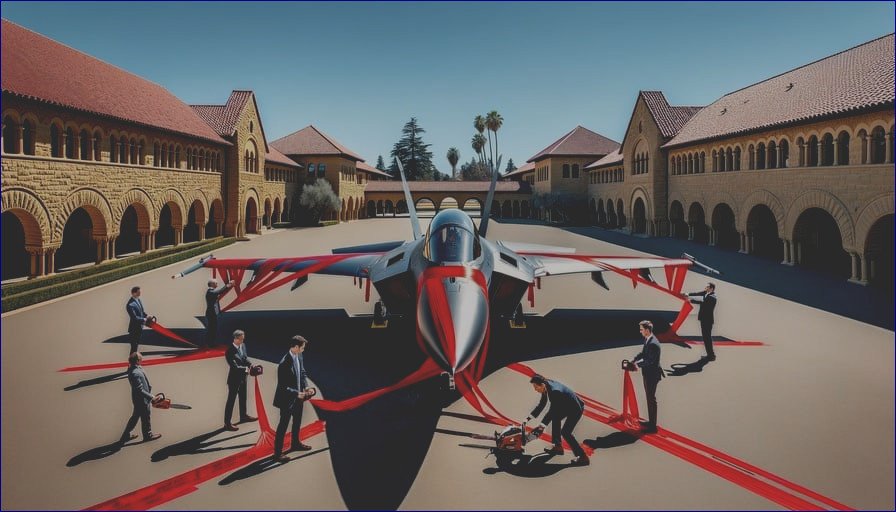In a surprising and contentious turn of events, Stanford’s Handshake platform administrators have flatly denied the application of Aurelius Systems, a burgeoning defense technology startup, to join its job-listing ranks. Just a stone’s throw from the hallowed halls of Stanford, Aurelius Systems is ambitiously engineering the future of warfare—developing “edge deployed directed energy” weaponry, colloquially known as laser guns. These advanced devices aim to neutralize enemy drones, a feature of modern combat scenarios that is expanding rapidly.
With a robust infusion of $2.1 million in funding secured, Aurelius was in the market not just for any talent, but for “great roboticists” passionate about creating these innovative laser systems. Yet, when they reached out to Stanford to become an official employer, they encountered a swift rejection rooted in a policy that conflates their work with the broader “firearms” industry.
The Handshake administrators wield the authority to automatically flag employers engaging in certain sectors—firearms, gambling, alcohol, and tobacco among them. Applications from these factions are subjected to scrutiny, wherein administrators reserve the right to accept or decline based on their ideological preferences. This begs the question: on what grounds do they justify excluding prospective employers like Aurelius based solely on their industry affiliation?
This incident reflects a growing undercurrent of anti-defense sentiment permeating Stanford’s campus. Notably, during the past winter, an initiative proposed by a group of Stanford Graduate School of Business students to establish a Defense Technology Club was thwarted by a disapproving committee, while clubs focused on more leisurely pursuits, such as an Epicurean club and an Improvisational Theater Troupe, received the green light. The disparity is striking.
The crux of Aurelius’s rejection raises profound ethical implications regarding the role of academic administrators in curbing students’ exploration of career avenues. Whether one resonates with the notion of defense technologies or not, educational institutions operate best in a non-ideological sphere, allowing students the latitude to navigate their own moral compasses freely. With rigid guidelines dictating what constitutes ideologically acceptable occupations, the very essence of a vibrant academic discourse is threatened. A genuine marketplace of ideas necessitates the freedom for students to evaluate and choose their paths, undistorted by administrative biases.
Ironically, Stanford has recently implemented a new free speech policy meant to encourage a variety of viewpoints. However, the principles that underpin free speech extend far beyond public discourse—they also encompass employment choices. Thus, if the university is sincerely committed to fostering diverse perspectives, it should logically extend this ethos to employer rejections.
Applying Stanford’s anti-firearms stance uniformly could logically wipe out listings for numerous industry giants on Handshake, including Boeing, Anduril, and Palantir—some of which are also entrenched within the defense sector yet operate within perceived societal acceptance. Aurelius, a military defense contractor, stands no different from these other heavyweights in terms of its role in the broader defense landscape.
Moreover, embracing the emergence of defense tech startups could catalyze significant upheaval in a stagnating defense contracting arena, where behemoths like Boeing, Raytheon, and Lockheed Martin frequently suffer from overruns and inefficiencies—costing taxpayers dearly. The need for disruption in this sector has never been more urgent, especially considering America’s recent technological military vulnerabilities in the wake of competition from nations like China.
Aurelius’s mission—developing scalable, economical laser systems capable of incapacitating drones—bears immense relevance in contemporary warfare, where drones have redefined confrontations in places like Libya, Nagorno-Karabakh, and Ukraine. As tensions escalate around Taiwan, these advanced systems could prove invaluable in counteracting various threats, solidifying their role in maintaining global security.
For engineers at Stanford, engaging in the preservation of democratic values is arguably far more consequential than creating yet another marketing-focused application. Certainly, the notion of weaponry can yield discomfort, but the moral imperatives of ensuring military supremacy to thwart authoritarianism from adversaries—be it China, Russia, or Iran—demand attention. Thus, discouraging students from pursuing vital defense-related endeavors is a disservice to both the institution and the greater cause of democratic integrity.
The rejection of defense tech employers, alongside the thwarting of opportunities like the Defense Tech Club, signifies more than mere policy—it signals a perilous trend that undermines the pioneering spirit that Stanford prides itself on. This trajectory must be redirected if Stanford wishes to uphold its storied legacy while effectively preparing its students to tackle the formidable challenges poised by the twenty-first century.

